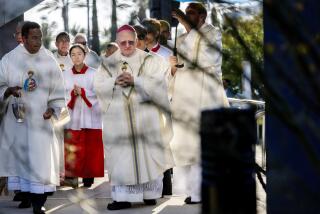Trial of Clergymen Accused of Malpractice in Suicide Begins
- Share via
Friends and acquaintances of a 24-year-old Tujunga man who committed suicide in 1979 testified Wednesday that he became despondent, obsessed with religion and estranged from his family when he began associating with members of a Sun Valley Protestant church.
In what is believed to be the nation’s first “clergy malpractice” trial, a Glendale Superior Court jury will be asked to decide whether pastors at Grace Community Church of the Valley in Sun Valley were negligent in their counseling of Kenneth Nally, leading the severely depressed man to kill himself with a shotgun.
The case--pitting the young man’s parents, Walter and Maria Nally, against four of the church’s pastors--was filed in 1980. After five years of legal delays, opening arguments began Wednesday.
Opening Statement
“Some of the pastors were negligent in how they handled his problems, and, as a result of their negligence, Kenneth killed himself,” the family’s attorney, Edward Barker, asserted in his opening statement to the jury.
The family is seeking unspecified damages in the civil suit.
Barker is attempting to prove that Nally had no history of depression before joining the church in 1974. His depression grew worse after the December, 1978, breakup with his girlfriend, Katie Thayer, an active church member, the family maintains.
A boyhood friend, Mark Stanners, testified that through high school, Nally was “a very personable kid, at the top of the class. He never seemed depressed.”
But after Nally entered UCLA and became a member of the church, Stanners said, “He was a completely different person. He was always talking religion, religion, religion.”
Scheduled Witnesses
Barker said in his opening statement that witnesses will testify over the next several days that pastors at the church withheld from the Nallys information about their son’s desire to kill himself and knowledge of previous suicide attempts.
Barker further asserted that the pastors, untrained in psychology, equated Nally’s depression with sin and admonished him simply to read the Bible and “properly confess it (his sin) to God and own up to it.” Had they, instead, referred him to mental health professionals, Barker said, “he might have lived.”
Church officials have denied the allegations of negligence. The church plans to present witnesses who will blame Nally’s parents, alleging that they ignored the advice of several pastors to commit their son to a psychiatric hospital because the parents did not want him labeled “crazy,” according to church attorney Samuel Ericsson.
Ericsson and David Cooksey are representing the four defendants, John MacArthur, Duane Rea, Richard Thomson and Lynn Cory. Ericsson said Rea and Thomson have each counseled more than 200 depressed individuals and that Nally was the only one who had committed suicide.
Resistance Alleged
Ericsson said Nally resisted the church’s advice to see psychologists and psychiatrists because of his “abhorrence” for the two professions and his personal belief that counselors outside of the church “were not Christians.”
Barker said he will argue that pastors at the independent Protestant church instilled in Nally the belief that Catholics such as his parents were sinners and would not go to heaven unless they were “born again” at Grace church.
“They told him his father was not a Christian--he was only a Catholic,” Barker said.
Ericsson acknowledged in his opening remarks that Nally’s conversion to the Protestant religion became “a great source of problems” between father and son but that the son was encouraged to “love his father.”
Challenge of Evidence
The defense attorneys said they may challenge the admissibility of one piece of evidence that Barker considers “very important” to his case. It is a taped sermon in which Thomson reportedly says, “Suicide is one of the ways the Lord takes home a disobedient believer.”
Barker maintains that although the tape was made 18 months after Nally’s death, it demonstrates a church attitude of tolerance for suicide.
Cooksey said he may argue that the tape is irrelevant because of its timing. Church officials have steadfastly maintained that Thomson was not condoning suicide but merely explaining that although suicide is wrong, it would not prevent a believer from going to heaven.
More to Read
Sign up for Essential California
The most important California stories and recommendations in your inbox every morning.
You may occasionally receive promotional content from the Los Angeles Times.













